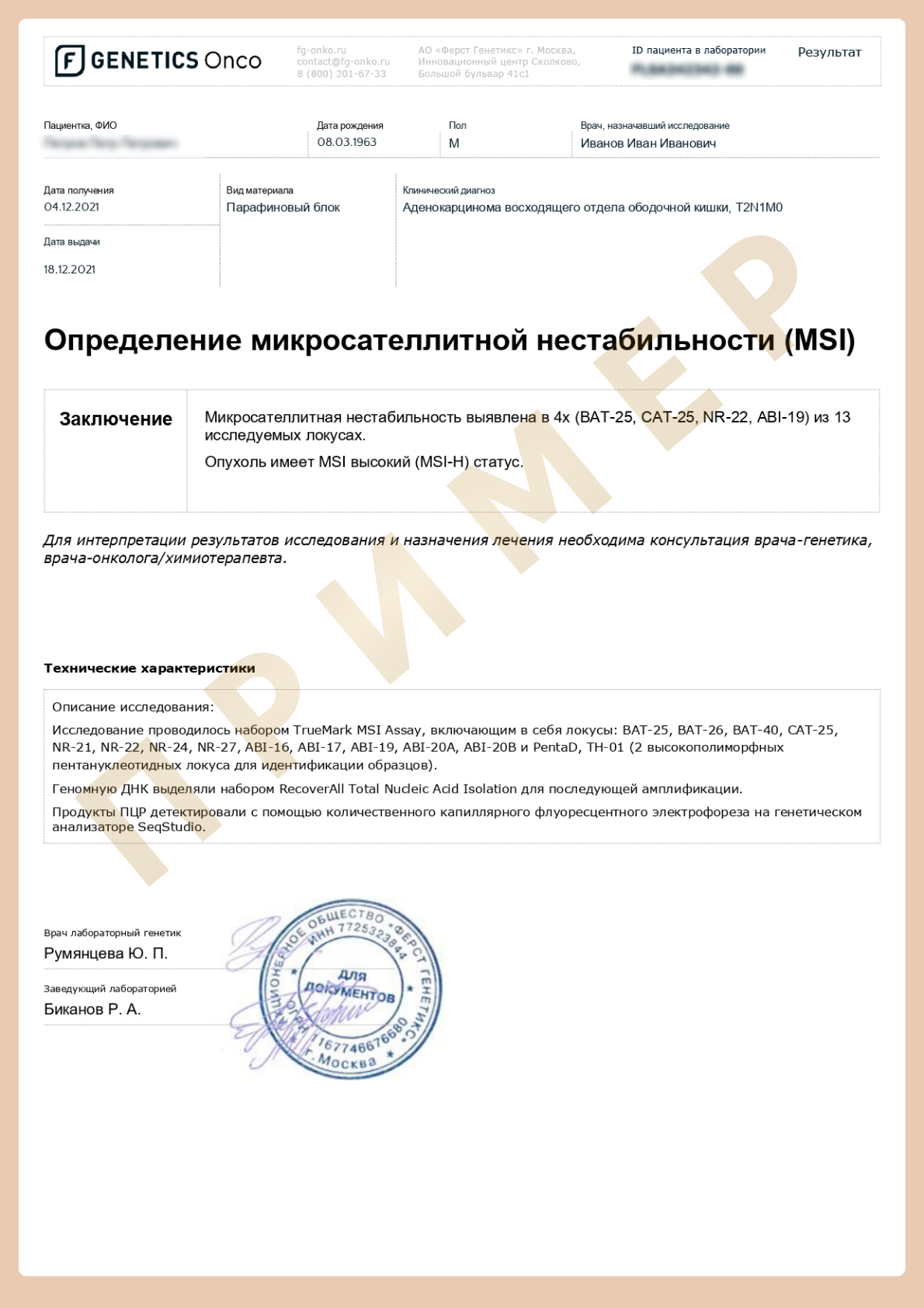

Microsatellite instability (MSI)
It is a test that identifies microsatellite instability (looks at DNA microsatellite length changes) in tumor tissue for cancer diagnostics and treatment (colorectal cancer, endometrial cancer, and several other solid tumors).
DNA mismatch repair (MMR ) system —
is a highly conserved biological system that recognizes, removes, and repairs erroneous base-base mismatches and insertion/deletion mispairs generated during DNA replication and recombination.
When the MMR system is deficient (dMMR), many mismatch errors accumulate, leading to genome-wide instability and the appearance of mutations — triggers of cancerogenesis. MMR system includes proteins: [1]:
MSH2 MLH1 MLH3 PMS1 MSH6 PMS2 MSH3 Exo1
DNA microsatellites
Microsatellites are short, organized by tandems, repetitive DNA segments that consist of 1 to 4 base pairs distributed throughout the human genome in both coding and non-coding regions. Due to their repetitive structure, microsatellites are particularly prone to DNA replication errors [1].
Microsatellite instability (MSI)
MSI is a genome instability/alterations due to defects in the MMR system (dMMR) characterized by a wide range of microsatellite repeat length polymorphisms. Defects in the DNA MMR system can be caused by germline (congenital, Lynch syndrome) and somatic and epigenetic changes.
Lynch syndrome (LS)
Lynch syndrome is a genetic disorder associated with an increased risk of developing several cancers such as colorectal, endometrial, gastric, and ovarian.
Why MSI testing is necessary?
are characterized by microsatellite instability (MSI-H/high status), i.e., have defects in the DNA mismatch repair system (dMMR).
Распространенность MSI-H в различных опухолях *
*Bonneville R, Krook MA, Kautto EA, Miya J, Wing MR, Chen HZ, Reeser JW, Yu L, Roychowdhury S. Landscpe of Microsatellite Instability Across 39 Cancer Types.
JCO Precis Oncol. 2017;2017:PO.17.00073. dol: 10.1200/PO.17.00073. Epub 2017 Oct 3. PMID: 29850653; PMCID: PMC5972025.
Ministry of Health of the Russian Federation and NCCN (National Comprehensive Cancer Network, USA) guidelines recommend MMR/MSI testing for the patients with colorectal and endometrial cancers for:
- cancer prognosis,
- to define treatment options,
- as a screening test for Lynch Syndrome [4, 9].
dMMR/MSI-High in tumor considers as:
- A marker of cancer prognosis
- A predictive marker that determines:
- the effectiveness of fluoropyrimidine adjuvant therapy,
- sensitivity to immune checkpoint inhibitors therapy (pembrolizumab, nivolumab, etc.).
- A screening test for Lynch Syndrome.. Patients with MSI-H tumors who meet the Bethesda/Amsterdam II diagnostic criteria should be advised to consider Lynch syndrome genetic testing in blood samples.
How does MMR/MSI testing perform?
Two methods are widely used for MMR system deficiency detection:
Immunohistochemistry (IHC)
The expression assessment of 4 proteins encoded by MMR system genes: MLH1, MSH2, MSH6, and PMS2. The negative result is the presence of expression of all 4 proteins, which means the DNA MMR system is not deficient. Loss of expression of ≥1 proteins is defined as a defect in the MMR system, and the sample is scored as MMR-defective (dMMR, positive result).
PCR and quantitative capillary fluorescence electrophoresis [8]
Assessment of changes in the lengths of certain microsatellite repeats. Panels of microsatellite markers can vary from manufacturer to manufacturer and can include from 5-7 or more microsatellite repeats.
Differences in the composition and number of markers in the panel determine differences in the sensitivity and specificity of the test.
The following results of the MSI status assessment are accepted:
- MSI-stable/MSI-S — no loci with instability
- MSI-low/MSI-L
- MSI-high (unstable)/MSI-H
However, recently, MSI-stable and MSI-low results are merged into MSI-stable status, with the conclusion indicating that no microsatellite instability was detected.
Laboratory First Genetics conducts MSI testing on the expanded panel of markers consisting of:
Pros of using the expanded panel for MSI testing
-
No additional control of normal tissue
No need to use healthy tissue/blood of the patient for control
-
Small amount of raw DNA
Only 2 ng of paraffin-embedded DNA (FFPE) needed
-
Fast result
7-10 days after receipt of material
Who orders MSI testing?
- Oncologist
- Oncologist chemotherapist
How to order MSI testing?
Download and fill out the informed consent form
A courier will collect histological material and take it to the laboratory free of charge.
First Genetics Laboratory
Specialists
Years of experience in genetics, laboratory diagnostics and bioinformatics
Confidentiality
All data is strictly confidential and cannot be passed on to third parties
Time frame
Results ready in a short time
Security
Extensive control at each stage of testing
No delivery fees
Free delivery of biomaterial across Russia
Charities
Email info@f-genetics.com for information


